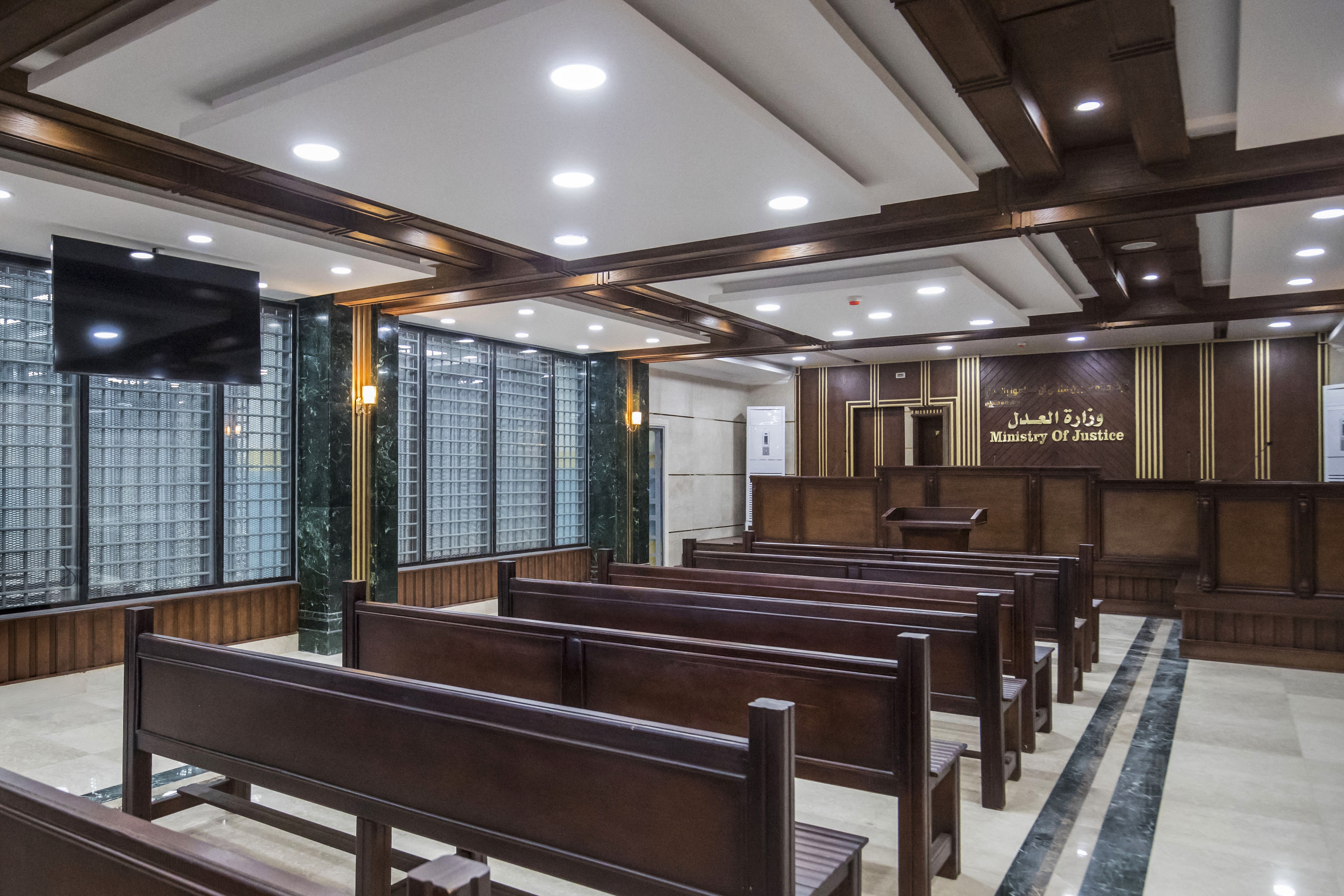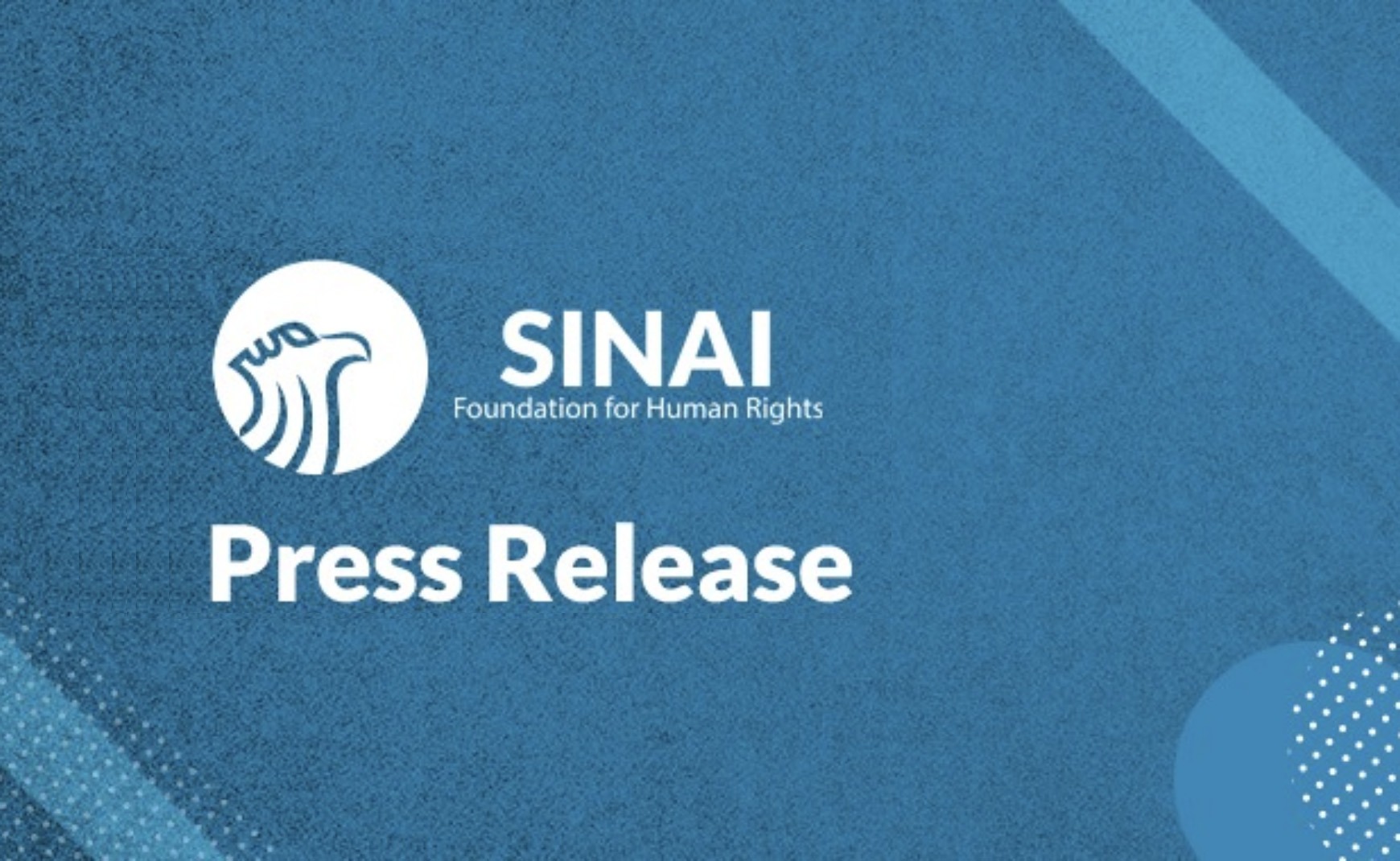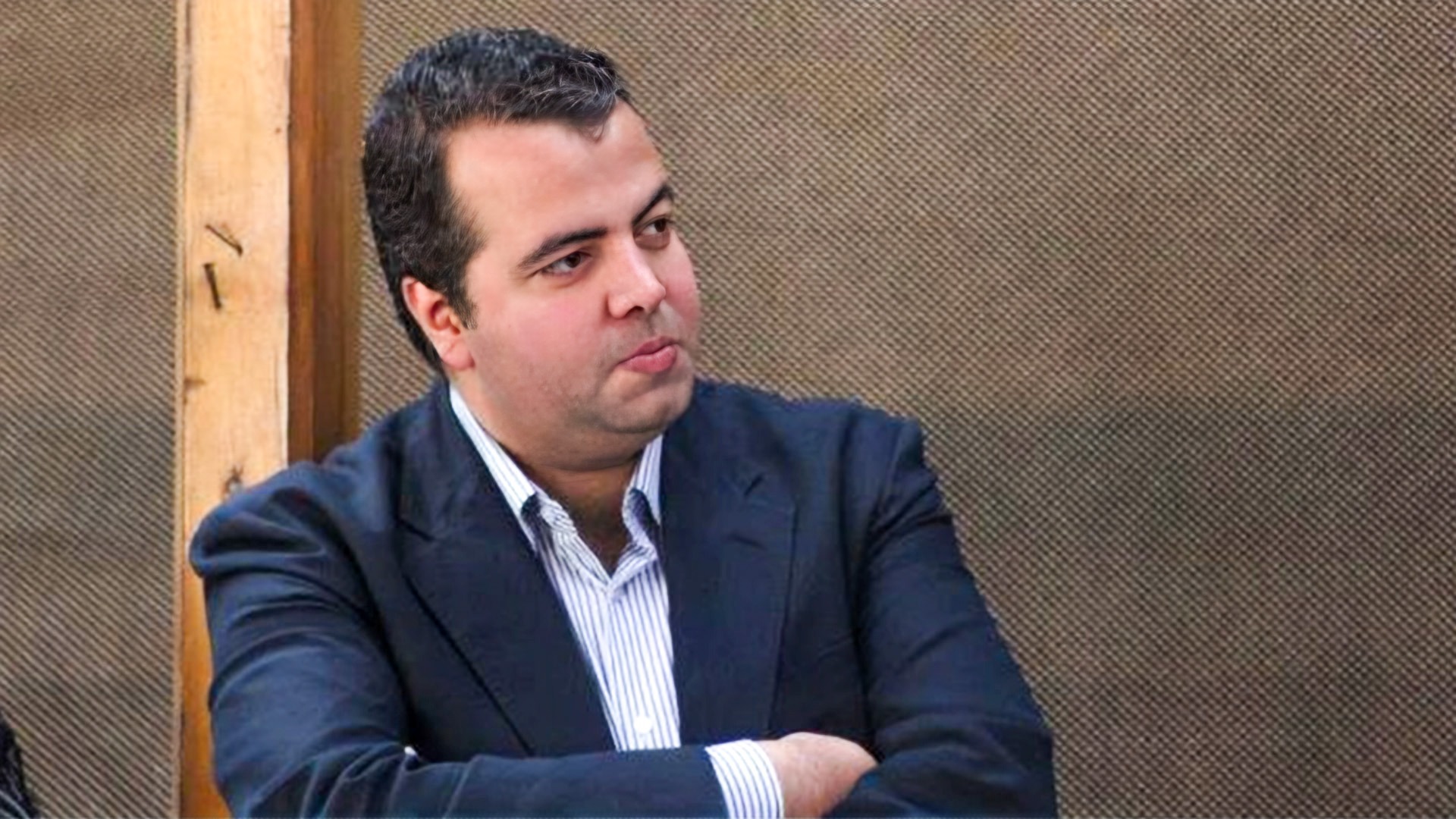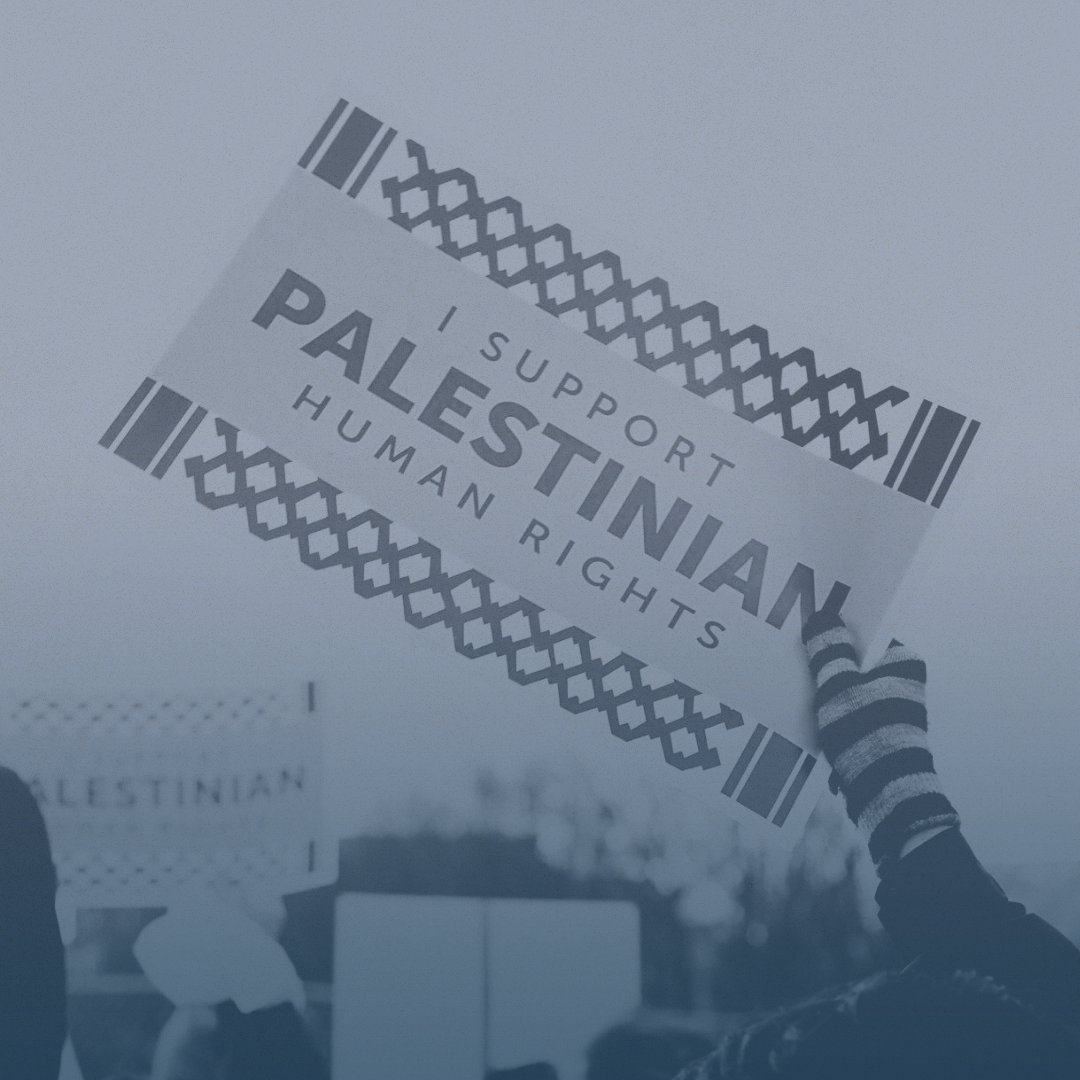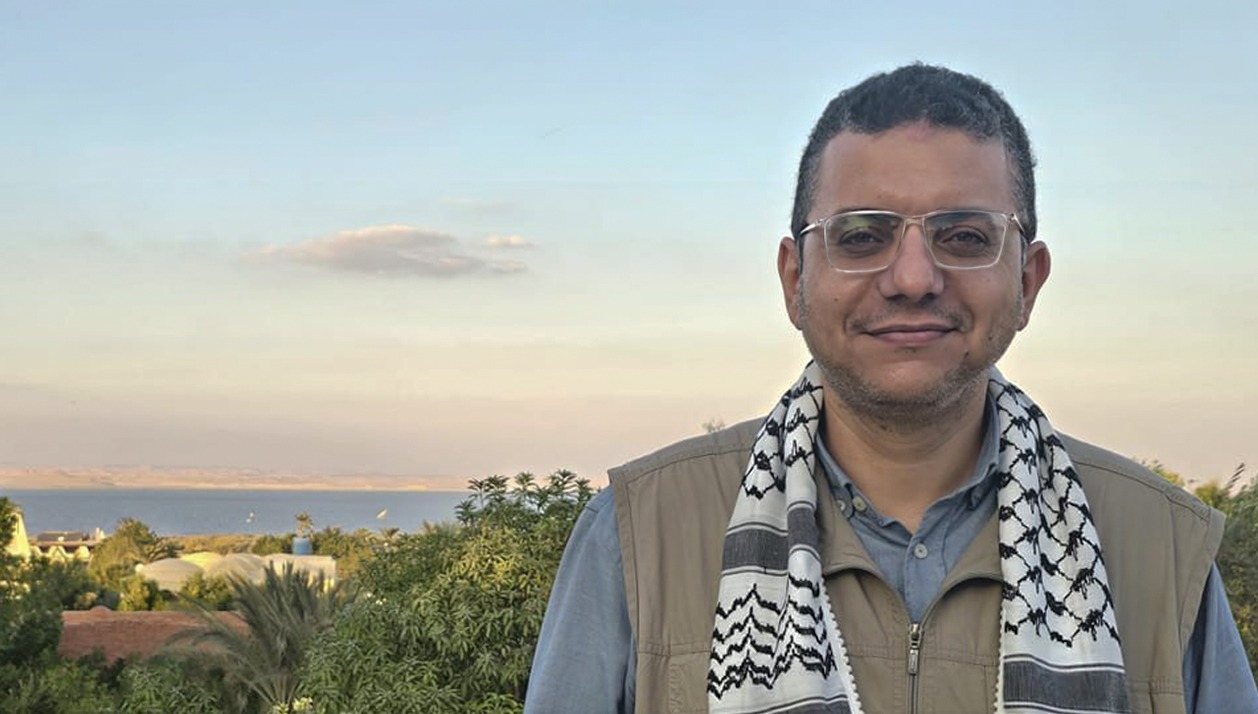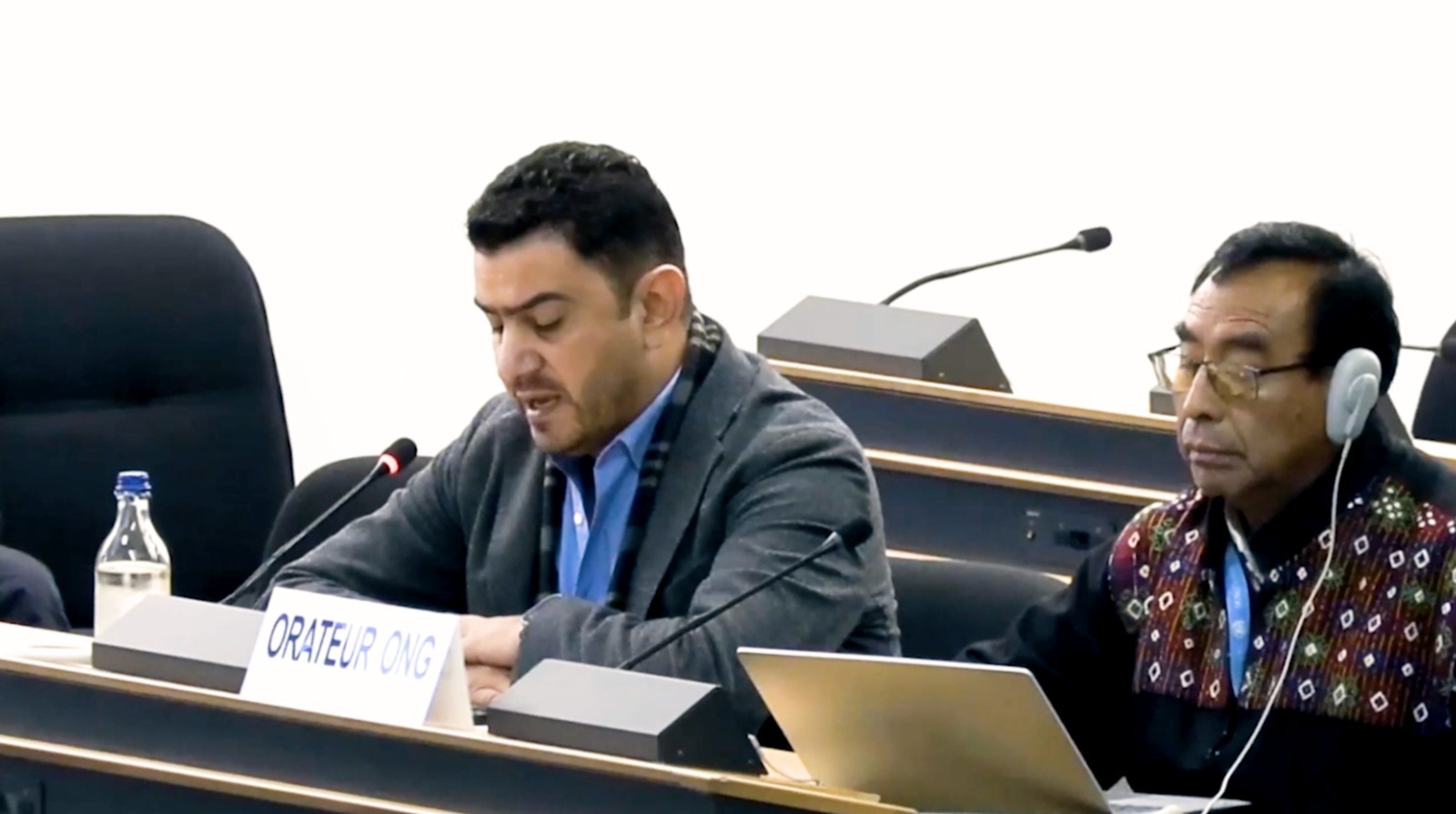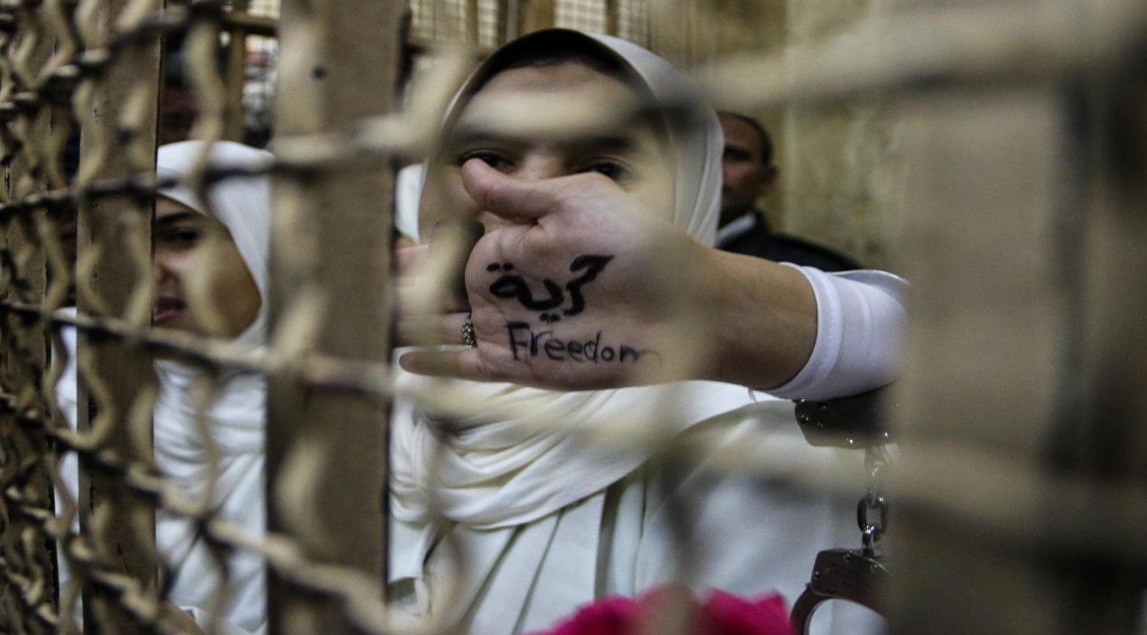
The most notable abuses that took place during November 2021
Summary:
Several abuses took place and were documented by the foundation’s legal team during November of 2021. Trials that lack the standards of fair trial were held, where civilians who had been forcibly disappeared for various periods of time appeared and others were recycled and charged in new cases and accused of joining a terrorist group according to National Security’s investigations, despite their release being ordered in previous cases where they were facing the same charges, however the release order was not executed.
Details of the abuses
Egyptian law enforcement forces abuses:
Forcibly disappeared individuals appearing in court as defendants
The Sinai Foundation for Human Rights followed trials of North Sinai civilians which lack the standards of fair trial, where the Supreme State Security Prosecution proceeded with investigating them during November 2021 and accused them of joining a terrorist group, based on National Security and military intelligence investigations.
The first incident was documented by the foundation’s legal team on 1 November 2021 where Huda Abdelrahman Ali Abdrabbuh, 18, appeared before the Supreme State Security Prosecution after two enforced disappearance periods of one year and five months. She and her mother, Sabah Suliman Saleem, were arrested on 19 December 2019. Huda was forcefully disappeared for 6 months by security services before she was brought in June 2020 before the Supreme State Security Prosecution in Cairo in relation to case 810 for the year 2019 for the court to order her release in December 2020. However, the security services refrained from executing the order and she was instead forcibly disappeared for the second time only to reappear on 1 November 2021 before the Supreme State Security Prosecution in relation to a new case numbered 1935 for the year 2021 where she was accused of joining a terrorist group.
The prosecution ignored the defendant’s statements regarding her enforced disappearance, and did not fact check her statement on the actual date of her arrest and illegal detention in detention centers that are not suitable with her being a minor.
The second incident was documented by the foundation’s legal team on 3 November 2021 where “Sabah Suliman Saleem Gumaa” appeared before the Ismailia prosecution after two periods of forced disappearance that lasted a year and five months. She and her daughter had been arrested on 19 December 2019 and Sabah was forcibly disappeared for 6 months before being brought before the Supreme State Security Prosecution in Cairo in June 2020, in relation to case 810 for the year 2019. The prosecution then ordered her release in December 2020, however, security services refrained from executing the prosecution’s order and Sabah instead disappeared a second time only to reappear before the Ismailia prosecution on 3 November 2021 in relation to a new case after the police wrote a recently-dated official arrest warrant.
The prosecution did not check the defendant’s statements regarding her enforced disappearance and ignored her statement on the actual date of her arrest or her detention conditions. The prosecution ordered 15 days of preventive detention after charging her with joining a terrorist group.
The third incident was monitored by the foundation’s legal team on 4 November 2021 where “Hend Khalil Abdelghani”, 39, appeared before the Supreme State Security Prosecution after two periods of enforced disappearance lasting 6 months. The prosecution ignored the defendant’s statements regarding the two enforced disappearance periods and did not mention the actual date of her arrest in official documents, as the defendant was brought before the State Security prosecution with an arrest warrant written on 3 November 2021 when the actual date of her arrest was 22 May 2021.
The defendant stated before the prosecution that she was arrested on the al-Qantara Sharq ferry on 22 May 2021 and was detained in the National Security base in Ismailia for two days, then was transported to the National Security base in al-Arish where she remained incarcerated for a month. Afterwards, she was brought before the Ismailia prosecution on 22 June 2021 in relation to case 424 for the year 2021 where she was accused of joining a terrorist group. Her release was ordered the next day on 23 June 2021.
The defendant stated that the security service did not execute the prosecution’s release order and she was instead detained in the first police station in al-Arish for 4 months without being allowed to contact her family or attorney until she was transported to al-Qantara Sharq police station on 26 October 2021, then to Abu-Suwir police station until she was brought before the State Security prosecytion in The 5th Settlement on 4 November 2021 in relation to a new case numbered 1935 for the year 2021 where she was charged with joining a terrorist group. The defendant denied any relations with armed groups in Sinai during the interrogations and said that she was tortured and electrocuted for a confession. She added that her husband has been incarcerated since 2004 after the Taba bombings.
The fourth incident was documented by the foundation’s legal team on 4 November 2021 where “Maliha Selmy Mashhour Salama”, 27, appeared before the Supreme State Security Prosecution after a forced disappearance period of two months. She was arrested by a military ambush on the al-Qantara-al-Arish international road and was brought before the military prosecution in Ismailia on 12 May 2021. The prosecution ordered her release 3 months after her arrest; however, the security services did not execute the release order, and she was instead forcibly disappeared in the first police station in al-Arish for two months until she was brought before the Supreme State Security Prosecution on 4 November 2021 in relation to a new case numbered 1935 where she was charged with joining a terrorist group.
During the Supreme State Security Prosecution interrogations in Cairo, Maliha said: “My father and my brother are imprisoned, and I am a divorcee. I have no first-degree male family members who could have any relations with armed groups in Sinai for me to be taken to force them to turn themselves in. I don’t know why I’m here”.
The fifth incident was monitored by the foundation’s legal team on 14 November 2021, where “Zainab Salama Dahbish”, her two children, and her mother, “Fatima Salim Mabrouk Atwa”, appeared before the military prosecution in Ismailia after a forced disappearance period of 5 months, in relation to case 176 for the year 2021 where they were charged with providing a terrorist group with logistic support.
The military court decided to hand the 5-year-old child over to a state foster-care center, refusing the mother’s request to hand the child over to his paternal grandfather. The court also denied the grandfather’s request to test the child’s DNA to prove his lineage and hand him over to his family, or to issue him an official birth certificate. The court, however, allowed the mother to keep the 8-month-old baby with her at the detention center to nurse him.
On Thursday 25 November 2021, the military court in Ismailia sentenced each of Zainab Salama Dahbish and her mother Fatima Salim Mabrouk Atwa to 3 months in prison for providing a terrorist group with logistic support.
The sixth incident was monitored by the foundation’s legal team on 17 November 2021, where “Osama Azmy Hassan Mohamed”, 31-year-old communication engineer, appeared before the Supreme State Security Prosecution in Cairo in relation to case 1935 for the year 2021. He was charged with joining the Sinai Province group by the prosecution. Osama denied the charge during interrogations and insisted that the arrest date stated in the arrest warrant is incorrect and that the Ministry of Interior refrained from releasing him after he finished his prison sentence for another case. The prosecution disregarded his statement about his forced disappearance and did not fact-check it.
The defendant mentioned before the prosecution during interrogations that a force from the first police station in al-Arish arrested him on 1 November 2014 and he was detained in the national security base in al-Arish. There, he learned that he was being charged in case 423 for the year 2013, publicly known as Ansar Bait al-Maqdis since May 2014. A week later, he was brought before the Cairo criminal court held in the Institute of Police Secretaries. The case remained under deliberation till the court ordered on 2 March 2020 the imprisonment of the defendant for five years and the probation for five years for joining a terrorist group. According to this ruling, the defendant finished his full sentence, and the prison administration is to transfer him to the police station where his place of residence is registered to finalize his release procedures. However, the defendant remained in custody in Tora maximum-security prison for 4 months despite finishing out his sentence.
The defendant added that the prison administration transported him on 15 July 2020 from Tora prison in Cairo to the first police station in al-Arish in preparation for his release. He mentioned that the first police station in al-Arish informed him on 27 July 2020 that he would be released. They took his fingerprints and asked him to sign an undertaking to turn himself in to the station on a daily basis for 5 years for the purpose of monitoring. Nonetheless, the station authorities did not release Osama despite finishing all the release procedures and detained him in the station for 55 days after which he was transferred to the National Security base in al-Arish on 23 September 2020.
Osama was forcibly disappeared for almost a full year in inhumane conditions that led to the deterioration of his health and his transfer to al-Arish general hospital on 20 September 2021 where he was in treatment for 15 days before being transferred back to the National Security base in al-Arish. He was brought before the Supreme State Security Prosecution on 17 November 2021 to be recycled in connection to a new case numbered 1935 for the year 2021. The prosecution charged him with joining the Sinai Province group, which is the same charge for which he served a sentence of 5 years after which he was not released.
The seventh incident was monitored by the foundation’s legal team on 22 November 2021 where “Iman Eid Awad Murshid”, 24, appeared before the Supreme State Security Prosecution in Cairo after 3 months of forced disappearance. She had been arrested in August 2021 inside the Ismailia hospital where she was with her mother-in-law where the latter was receiving treatment. Iman was detained in the National Security base in Ismailia till she was brought before the National Security prosecution on 22 November 2021 in relation to case 1935 for the year 2021 where she was charged with joining a terrorist group and financially supporting a terrorist group. The interrogations revolved around her husband, Hassan al-Tarrify’s activities.
The eighth incident was monitored by the foundation’s legal team on 23 November 2021 where “Amal Mohamed Hussein Amr”, 32, appeared before the Supreme State Security Prosecution in Cairo after 80 days of enforced disappearance. The defendant’s husband, “Islam Salih Salama Saad” had been reportedly arrested 3 days before his wife, and his whereabouts are still unknown.
The defendant stated during interrogations that she was arrested on 3 August 2021 at her home. She denied knowing of any relations between her husband and armed groups, as well as denying any knowledge of raw materials used in making explosive devices in her home. She added that she is a housewife with a technical diploma and that her level of education does not qualify her to recognize such materials. She stated that after her arrest, she was transported to Ismailia where she was interrogated in the Security Directorate base, then she was later taken to the National Security base in Ismailia where she was detained for 20 days before being transported to Abu-Suwir police station in Ismailia where she was detained for 3 months.
On 22 November 2021, the defendant was transported to the Ismailia Security Directorate where the authorities wrote a recent warrant for her arrest as if the previous period of her detention never existed. On 23 November 2021, Amal was brought before the Supreme State Security Prosecution in Cairo in relation to case 1935 for the year 2021 where she was charged with joining a terrorist group.
The ninth incident was monitored by the foundation’s legal team on 23 November 2021 where “Shireen Gumaa Salim Salama” appeared before the Supreme State Security Prosecution in Cairo in relation to case 1935 for the year 2021. The foundation reported that no attorney was present with the defendant, as the prosecution exerted no real effort to assign her an attorney to be present during the interrogation.
The tenth incident was documented by the foundation’s legal team on 1 November 2021 where the Supreme State Security Prosecution in Cairo interrogated three defendants, however, no attorney was assigned to them. The defendants are:
-
Ahmed Ashraf Kamal Farid
-
Ragab Mohamed Himdan Abu-Attia
-
Salman Hussein Suliman
Legal Analysis
Considering what the defendants stated before the prosecution, many infractions and violations of the Egyptian constitution took place, in addition to the prosecution’s violation of the most simple rules and procedural guarantees stated by the Egyptian law, especially in the case of initial investigations.
First: The detainment of arrested individuals without permission from the relevant judicial authorities for longer than the legal detainment period.
Article 54 of the Egyptian constitutions states that: “Personal freedom is a natural right which is safeguarded and cannot be infringed upon. Except in cases of in flagrante delicto, citizens may only be apprehended, searched, arrested, or have their freedoms restricted by a causal judicial warrant necessitated by an investigation. All those whose freedoms have been restricted shall be immediately informed of the causes therefor, notified of their rights in writing, be allowed to immediately contact their family and lawyer, and be brought before the investigating authority within twenty-four hours of their freedoms having been restricted…”
Article 36 of the Code of Criminal Procedure states that: “The criminal investigation officer shall immediately hear the statements of the arrested suspect who, if he fails to establish his innocence, shall be brought before the office of the competent public prosecutor within 24 hours. The office of the public prosecutor shall question him within 24 hours, after which it shall order either his remand in custody or his release.”
Article 40 of the same code states that: “No one shall be arrested or detained except by order of the legally competent authorities. Any person who is arrested or detained shall be treated in a manner conducive to the preservation of his human dignity and shall not be subjected to physical or mental harm.”
Second: The detainment of arrested individuals in unofficial detention centers which fall under no judicial supervision.
Article 41 of the Egyptian Code of Criminal Procedure states that: “No person shall be detained except in designated prisons. No warden shall accept any person without an order signed by the designated authority which is the general prosecution, and they are not to be detained beyond the time period specified in the order.”
Article 42 of the same code states that: “Members of the Department of Public Prosecutions and presidents and vice-presidents of courts of first instance shall be empowered to inspect the public and central prisons situated within their areas of jurisdiction in order to ascertain that no one is being detained unlawfully. They shall have the right to examine prison records and arrest and detention orders, take copies thereof, contact any detainee and hear any complaint that he might wish to submit to them. The prison governors and staff shall provide them with any assistance needed to obtain the information that they request”
Article 1 bis of the Prisons Regulation Act No. 396 of 1956 states that: “Any person who is detained, arrested, taken into custody or deprived of his freedom in any other way shall be committed to one of the prisons indicated in the previous article or in one of the places specified by a decision of the Minister of Interior and in respect of which all the provisions of the law apply, provided that the right to their access as stipulated in Article 85 shall be accorded to the Public Prosecutor or the person he deputizes from among the staff of the Public Prosecution with a rank not below that of Chief Prosecutor.”
Third: Keeping individuals detained after their release was ordered and accusing them in new cases whose subject matter was the same as the ones where their release was ordered.
Several defendants were interrogated at the Ismailia court which ordered their release. The release orders, however, were not executed, taking into consideration that the new cases in which they were recycled revolve around the same matter as the previous ones where their release was ordered. This renders the pre-trial detention and the cause for its execution useless making this situation a case of extrajudicial detention covered under a blanket of legality by new warrants – which the defendants’ attorneys proved fake to the prosecution – because the defendants never left the detention centers and the court’s orders of their release were never really executed.
It is worth mentioning that investigation authorities purposefully overlooked all these apparent legal violations and did not uphold their role to prosecute those who detained these civilians, as well as neglecting to summon the security forces that accompanied the defendants to corroborate their statements on being brought from unofficial detention centers where they were mentally and physically abused.
The prosecution also ignored the defendants’ statements during their investigations regarding their previous detention based on the same charges and did not fact-check said statements by reviewing the files for previous cases where their release was ordered and checking the presented evidence to accurately and objectively look into the defendants’ situations. What happened instead was that the prosecution did not do their part in pursuing justice and fairness for the defendants they are presented with, instead hastily ordering their imprisonment without real and objective interrogations which violates the bases of proper criminal investigation and the rights and guarantees provided to defendants by legislations during initial investigations and preventative detention.
Fourth: The prosecution deliberately preventing the defendants’ attorneys from accessing investigation reports and interrogating the defendants in the absence of a lawyer.
Article 125 of the Code of Criminal Procedure states that: “The lawyer shall be given permission to examine the case file on the day prior to the interrogation or the confrontation, unless the judge decides otherwise. In no case may the accused persons be separated from their lawyer who shall be present during the questioning.”
The foundation monitored during November three defendants being brought before the Supreme State Security Prosecution in the absence of a lawyer, which the foundation also documented in October by the same prosecution body with two defendants, and the prosecution did not exert real effort to contact the defendants’ families and lawyers, instead only used the repetitive preamble in which it is stated that it sent a representative to the base of the Bar Association and found it closed, while the defendant interrogations take place between one and three in the evening which is a time in which a large number of lawyers are present in the Association which is considered to be a circumvention by the prosecution of the defendants’ rights to a lawyer present with them during interrogations as dictated by the constitution and the law.
Article 124 of the Code of Criminal Procedure states that: “In cases of felonies and misdemeanours which are punishable by prison, no investigator may interrogate a suspect or confront said suspect with other suspects or witnesses unless their lawyer is summoned, except in cases of flagrante delicto and urgency out of fear of loss of evidence. The suspect shall state the name of the lawyer thereof in a report written at the court registry or to the warden of the prison, or to the investigator. The lawyer may also do so himself. If the suspect has no lawyer or their lawyer does not show up after being summoned, the investigator is to assign the suspect a lawyer and the lawyer is to document in the report their objections, requests or notes.”
Article 125 of the same code states that: “The lawyer shall be given permission to examine the case file on the day prior to the interrogation or the confrontation, unless the judge decides otherwise. In no case may the accused persons be separated from their lawyer who shall be present during the questioning.”


